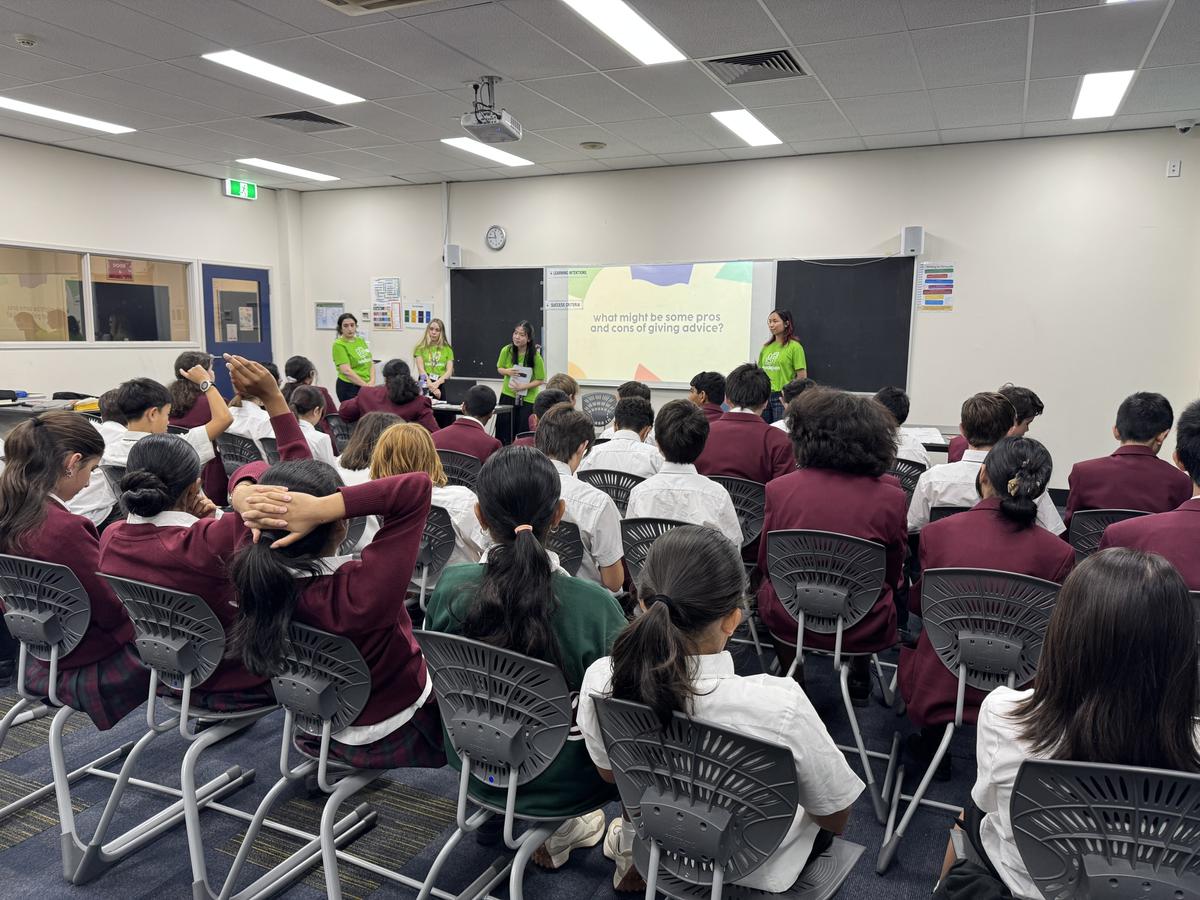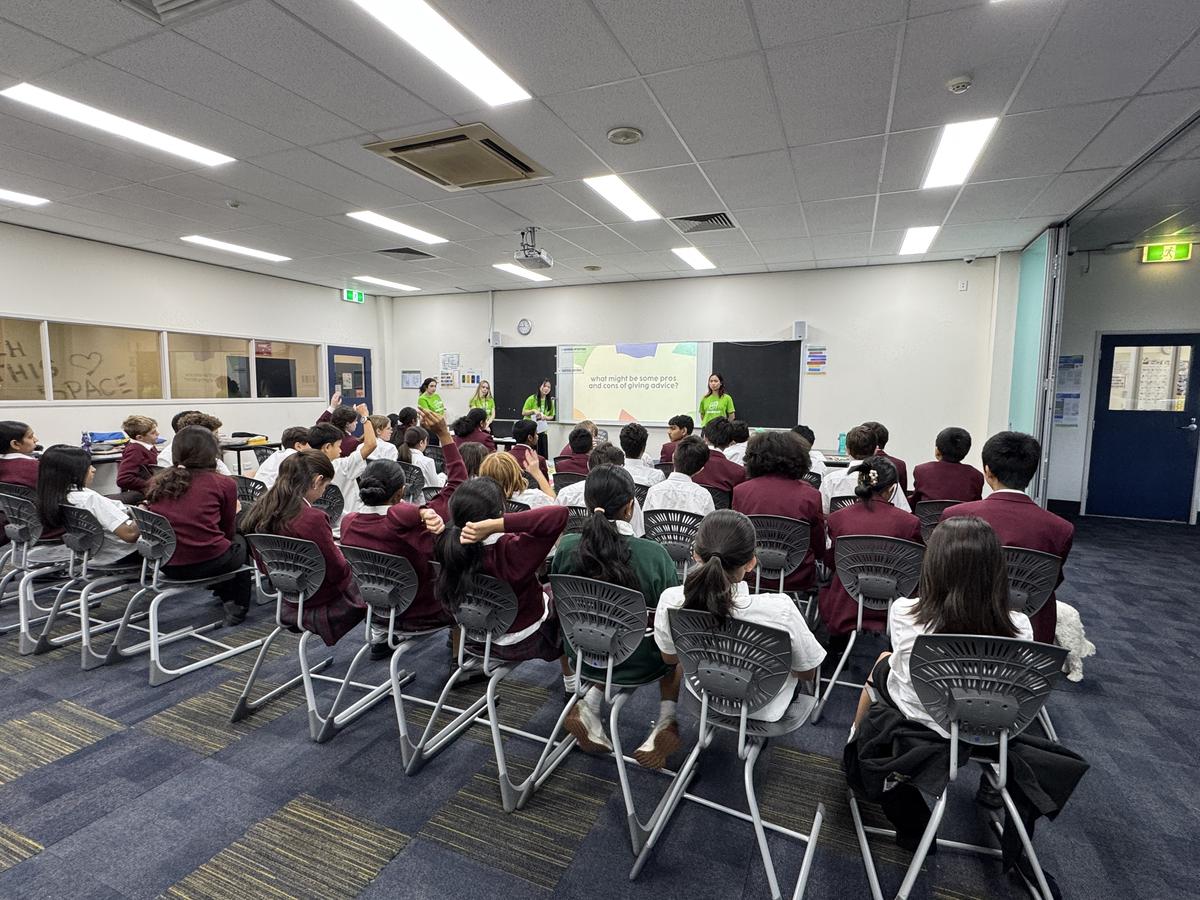Wellbeing

Beginning Of Term 2:
Respectful Relationships
Respect sits at the core of all safe and healthy relationships.
Research tells us that disrespect towards women and sexism contribute to a culture that allows, justifies, or even promotes violence towards women. Challenging disrespect towards women is everyone’s responsibility. By calling out disrespectful behaviours, we can help create a community where everyone feels safe, equal, and supported.
Our school uses the Department of Education’s evidence-based teaching and learning resources to teach our students about Respectful Relationships from Year 7-12.
Respectful Relationships education is provided by all Victorian government schools and supports students to develop the knowledge, attitudes and skills needed for respectful relationships and helps to build respect and equality across the entire school community.
For more information, please visit https://www.vic.gov.au/respectful-relationships
16 ways you can call out sexism and disrespect
1. Don't laugh at sexist jokes.
2. Give a disapproving look to show a behaviour or statement is not okay. Shake your head or roll your eyes.
3. Leave a pointed and uncomfortable silence.
4. Make a light hearted comment: "What century are you living in?"
5. Check in with the person affected: "I heard what he just said – are you okay?"
6. Privately let them know their behaviour is not okay: "The joke you made in yesterday's meeting was not funny, and actually not okay."
7. Calmly disagree and state that the comment is wrong or unacceptable: "I know you probably didn't mean it, but I found what you said to be offensive."
8. Speak up and educate by explaining why you disagree: "Actually evidence shows the vast majority of women do not make up false claims of sexual assault."
9. Challenge the logic: "That's not my experience" or "What makes you think that?”
10. Stand up for the person affected: "Michelle was saying something, and you cut her off again."
11. Make eye contact with the person affected – let them know you're an ally.
12. Show your emotion: "It actually makes me sad / uncomfortable when you say that."
13. Support others when they call it out: "I agree, that's not funny."
14. Appeal to their better self: "Come on, you're better than that."
15. Report the behaviour to management, or via incident reporting systems if available.
16. Disrupt or distract the situation to redirect the focus from the incident to someone else.
There is no 'right' way to call it out. Don't forget to put your own safety first - if a situation is already violent or looks like it could turn that way, always call triple 000.
If you or someone you know need support, help is available https://safesteps.org.au/
(Adapted from Respect Victoria, Feb 2025)
Tips for a Healthy Headspace
On Tuesday 6 May, all Year 7 students were involved in a mental health workshop facilitated by Headspace Syndal.
They spoke about
- What is mental health, the mental health continuum
- Signs of mental health difficulties
- Looking out for your friends and yourself
- How to seek help (headspace, eheadspace, other resources).
Good mental health allows young people to work and study to the full potential, cope with day-to-day life stresses, feel connected to others, and ‘bounce back’ when things go wrong.
Just like physical health, good mental health takes regular effort. Here are some ways that family and friends can do to support young people to look after their mental health.
- Eat well: A good balanced diet with more of the good things (e.g. vegetable, fruit, whole grains, and plenty of water) will help your young person’s body and brain function well.
- Sleep well: A good night’s sleep is really important for young people and their mental health. Encourage regular sleep routines, such as waking up around the same time every day, getting out of bed after waking up, and going to bed around the same time each night. Encourage them to shut down their phone or devices a few hours before bedtime can also help them sleep better.
- Stay active: Regular physical activity can help your young person to sleep better, improve their ability to cope and boost their mood. Going for a walk with your young person can also provide a great opportunity to talk.
- Set realistic goals: Helping young people to set realistic and achievable goals, while celebrating their achievements, can be really empowering for them. Listening to young people’s challenges and disappointments is also important.
- Connect: Regularly spending time with friends and family (including pets) and people in the community can strengthen your young person’s mental health and wellbeing. For example, setting up an activity that you both enjoy, like a walk or a hot drink together after dinner, and listening without judgement to your young person.
- Seek help: There may be times when support from family and friends is not enough, and your young person needs to get professional support. Encourage them to see one of the Student Wellbeing Team, their general practitioner (GP), or visit Headspace https://headspace.org.au/
Penny Hsiao, Health Promotion Nurse
Penny Hsiao
Health Promotion Nurse
Wellbeing Report
Nurturing Wellbeing and Readiness for LearningA message from Elizabeth Smith, Director of Student Wellbeing
As we move through Term 2, it's a wonderful opportunity to focus on building positive habits that support our young people—both emotionally and academically. With exams approaching for many of our students, the Wellbeing Team is here to remind families and students that preparation is about more than just study notes and practice exams—it's also about looking after your mental health and feeling confident and supported.
This term, our focus continues to be on fostering a school environment where students feel safe, connected, and equipped to face challenges with resilience. A key part of this is helping our students build good routines and knowing when and how to reach out if they’re feeling overwhelmed.
Year 7 Mental Health Workshop – Building Foundations for Wellbeing
On Tuesday 6 May, all Year 7 students took part in a valuable mental health workshop delivered by Headspace Syndal. These sessions covered:
- Understanding mental health and the mental health continuum
- Recognising signs that someone may be struggling
- Supporting friends and knowing how to ask for help
- Knowing where to access help (e.g., Headspace, eHeadspace, trusted adults)
Workshops like these help our students feel empowered to speak up, support their peers, and develop the self-awareness they need to thrive.
Healthy Habits for a Healthy Headspace
At South Oakleigh College, we encourage our students to develop daily habits that support their learning and wellbeing. These are simple but powerful strategies that you can also reinforce at home:
✅ Eat well: A balanced diet helps with concentration and energy—more wholefoods, less sugar, and plenty of water.💤Prioritise sleep: Aim for consistent bedtimes and limit screen time in the evenings. Sleep is essential for focus and emotional regulation.🏃Keep active: Even short bursts of movement—like a walk or some sport—can lift mood and reduce stress.🎯Set realistic goals: Break work into manageable steps. Help your child recognise their achievements and setbacks with kindness.🤝Stay connected: Spending time with family, friends or pets builds emotional strength. Even simple routines like chatting during dinner can help.🧠Reach out: If your child is struggling, remind them that asking for help is a strength. Our Wellbeing Team is here to support them with care and compassion.
Preparing for Exams – Start Now, Start Well
As we approach mid-year exams, it’s important to begin gently building productive habits now. We encourage students to:
- Create a dedicated, organised study space
- Use a planner or calendar to track assessment dates
- Study in short, focused blocks with breaks in between
- Talk to teachers early if they’re feeling unsure or behind
Balancing study with self-care is key—your young person’s mental wellbeing is the foundation for their academic success.
Our Commitment to Student Wellbeing
At South Oakleigh College, we are proud to have a dedicated and highly skilled Wellbeing Team who work together to support every student across all year levels. Whether it's mental health support, learning adjustments, advocacy, or crisis intervention, our team is here to ensure that no student falls through the cracks.
We also work closely with external agencies such as Monash Youth Services, Headspace, and the Monash Mental Health Network, and we host regular team meetings to ensure that students are triaged to the right support in a timely and thoughtful way.
If you have concerns about your child’s wellbeing or just want to learn more about how we can help, please don’t hesitate to reach out. Together, we can ensure your child feels safe, supported, and ready to succeed.
Warm regards,
Elizabeth Smith
Director of Student Wellbeing




